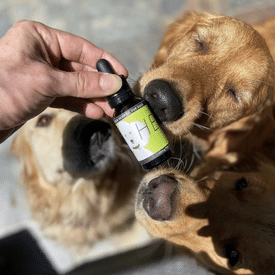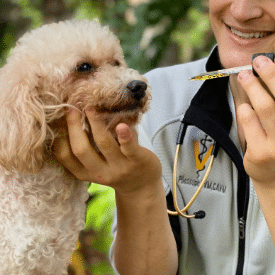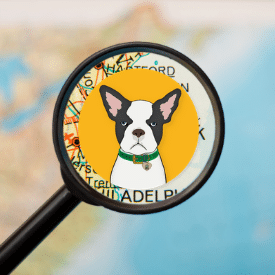Canine Cognitive Dysfunction: Dementia in Dogs

When your dog enters their senior years, you may notice a change in their behavior. It can be tough to spot at first, but if your senior dog is showing behavioral changes, it may be time to take them to the vet to find out if they have Canine Cognitive Dysfunction (CCD). CCD is also known as dementia in dogs, sundowners, or “dogzheimers” but all are terms for the same cognitive issues.
If your dog is diagnosed with CCD, it can be heartbreaking. Nobody likes to see their best friend suffer, and as your pet ages, you may feel helpless. But, you can help make your pet’s twilight years comfortable by knowing the symptoms of CCD, minimizing stress, and adding all natural supplements to your pet’s regimen.
Table of Contents
Signs of Canine Cognitive Dysfunction or Dementia in Dogs
Recognizing CCD or dementia in dogs is not quite as straightforward as it is in humans. Your dog cannot tell you that they forgot something, they cannot tell you that they are scared or worried or don’t know where they are. So as your pet ages, it is important to pay attention to their habits and routines so that you can know when something is off, and recognize the presence of dementia in dogs.
Since there is no easy test to diagnose a dog with CCD, it is important that you write down any observations you have made and bring that paper to the vet.
Your veterinarian may be looking for the following symptoms of Canine Cognitive Dysfunction:
Disorientation and Increased Anxiety
One sign of CCD or dementia in dogs is that you may notice your dog pacing behind closed doors. The reason for the pacing is usually due to being lost. They may not remember how to exit the room or might not remember the home at all. You may also notice them gazing into space; almost as if they are staring into the wall. This could be a house they have lived in for years. They may simply not recognize it, due to a declining mental state.
This will understandably lead to increased anxiety. Think about what would happen if we were completely lost and didn’t know where we were or where to go. We would become anxious ourselves. Excessive anxious barking may occur. You know your dog’s bark and what each one means. You may hear anxious or nervous barking, along with some possible howling, signs of their distress.
Lack of Bowel Control
Another sign of CCD or dementia in dogs is a lack of bowel control. Even if your dog has the best track record for using the bathroom outside, they might start having accidents inside the house. Stay calm if this occurs; this isn’t their fault. They may lose control of their bowels due to anxiety or another underlying condition. Comfort your dog and let them know everything is going to be okay. If you remain optimistic, they are more likely to remain optimistic.
Changes in Appetite
You may also notice a decrease or increase in appetite with CCD or dementia in dogs. Usually, this is due to increased anxiety, but it could also be that due to their CCD, they just forget to eat. They may not eat until they remember, or they may eat if you place their food bowl directly in front of them.
Changes in Hearing and/or Vision
It is important to note that changes in hearing or vision can cause some of the same symptoms as CCD or dementia in dogs. For example, a dog who is losing hearing or vision may become disoriented and may have increased anxiety as a result. Have your vet test for hearing and vision problems to rule out CCD or dementia in dogs.
Supporting Dogs With Dementia or Canine Cognitive Dysfunction
There is no cure for dementia in dogs or Canine Cognitive Dysfunction. However, there are ways that you can help keep your pet comfortable and slow their decline.
Minimizing Stress for Dogs With Dementia
Maintaining a regular routine is important for CCD or dementia in dogs. A routine can help your dog maintain a sense of calm and balance, even if they have trouble remembering the routine. In addition, it can soothe their anxiety to listen to soft music and exercise regularly.
Another tip for dogs with dementia, incorporating omega-3 fatty acids into their diet can also help brain health. Full Spectrum – Hemp Extract is one option that is rich in omega-3 and omega-6 fatty acids, which contribute to brain health. Additionally, essential oils, like lavender, can provide a calming effect and can help senior dogs with dementia feel comfortable.
It is important that you consult your veterinarian (we recommend a holistic vet when possible) to discuss supplements that can help slow decline and to discuss all of your options for dementia in dogs.
CBD For Dementia in Dogs

CBD has been shown to help brain function. This review showed how CBD can provide symptomatic relief for Alzheimer’s, stating “Recent studies using an AD mouse model have suggested that CBD can reverse cognitive deficits”. CBD has also been shown to help ease anxiety and stress. Minimizing stress is vital for dementia in dogs and can help your dog stay calm and comfortable in their senior years.
For Canine Cognitive Dysfunction, or dementia in dogs, we recommend our HEAL CBD oil for dogs, as it has 1100 mg of full-spectrum CBD and has a perfect balance of fatty acids and omega-3 and omega-6 fatty acids. CBD is a great supplement for supporting your dog with dementia.
Research on CBD for Dementia in Dogs
The AHVMA recently published a Scientific Review on the Integrative Treatment of Canine Cognitive Dysfunction, by Janice L. Huntingford, DVM, MS.
“CBD affects both GABA and serotonin receptors and has been shown to have anxiolytic properties (64). A review by Maroon and Bost discussed the neuroprotective benefits of CBD, which include decreasing the production of inflammatory cytokines, influencing microglial cells to return to a ramified state, preserving cerebral circulation during ischemic events, and reducing vascular changes and neuroinflammation (65). CBD has been shown to reverse or prevent the development of cognitive defects in a mouse model of AD (66). Other studies show that a combination of tetrahydrocannabinol (THC) and CBD in a full-spectrum product reduced memory impairment in AD mice. In other murine studies, cannabinoids were found to reduce oxidative stress, microglial activation, and neuroinflammation; facilitate removal of Aβ plaques and reduce their production; and decrease tau protein aggregation (66). Cannabinoids have been used in humans to reduce the signs of dementia in AD patients. Caregivers report decreased distress, agitation, and aggression and improvement in mood, appetite, and sleep quality in AD patients taking cannabis oil (67). Because CCD is a model for AD, this would suggest that cannabinoids may work in a similar way in canine patients.”
CBD Dosage for Dementia in Dogs
For Canine Cognitive Dysfunction, or dementia in dogs, we typically recommend a dosage of 35-50 mg of CBD per day. This is not a set dosage for every pet, as optimal dosage can vary by many factors, including age and disease progression. Our recommended CBD for dementia in dogs, HEAL: CBD Oil for dogs, contains approximately 37mg of CBD in a single 1mL dosage.
For administering the CBD oil for dementia in dogs, we recommend applying directly to the gums for the best and fastest absorption. We also recommend splitting your dog’s optimal daily dosage into multiple applications a day. This will help maintain blood concentration of CBD throughout the day. Additionally, it will help lower the possibility of any stomach upset as your pet’s gut gets used to the addition of an oil tincture.
Medicinal Mushrooms for CCD
Other than Full Spectrum Hemp Extract, there are few medicinal mushrooms that have been shown to be beneficial for cognitive function in dogs (and people). Lion’s Mane, Reishi, and Cordyceps all have amazing brain boosting effects to help slow and prevent CCD.
Lion’s Mane Mushrooms for CCD
The most notable CCD mushroom is Lion’s Mane, or Hericium erinaceus. Lion’s mane has some incredible benefits to the nervous system in addition to its immunosupportive properties.
Lion’s Mane is full of polysaccharides, which are prebiotics, thus benefiting gut function. A leaky or imbalanced gut microbiome has been linked to mental health issues, so the use of Lion’s Mane helps improve the microbiome and chronic inflammatory issues that are linked to neurodegeneration. By improving gut function, Lion’s Mane improves neurotransmitter function. In addition, by reducing inflammation throughout the body, including the brain, the permeability of the blood-brain-barrier is reduced and prevents undesirable substances from entering the brain space.
Lion’s Mane doesn’t just help an aging brain stay young, but it also improves memory and concentration in young (and old brains) alike. By increasing nerve growth factor (NGF) levels and protecting the myelin sheath, Lion’s Mane has been shown to improve memory and concentration. This is great for dogs with CCD since memory loss is a huge component of this pesky disorder.
Due to its ability to repair and protect the myelin sheath, Lion’s Mane is absolutely critical for those dogs suffering from various forms of myelopathy like degenerative myelopathy and constrictive myelopathy. It is a must have for any dog suffering from recent injury or surgery involving the nerves and/or the spinal cord.
Reishi Mushrooms for CCD
Another medicinal mushroom that is great for CCD is Reishi. Reishi is a very versatile mushroom with many nervous system benefits. It is a neuroprotectant, meaning it nourishes and protects the nervous system throughout the body. It helps support a healthy stress response by facilitating a proper adrenal function. By way of its antioxidant properties, it disrupts neural inflammation that is caused by free radicals. Thus, it can reduce stress, anxiety and has antidepressive effects as well.
Reishi mushroom is one of the most well known stress relieving mushrooms of them all. As mentioned before, stress and free radicals go hand in hand, and cause various disruptions to our mood and inflammation within our nervous system. Reishi mushroom is excellent at downregulating the activation of pro-inflammatory pathways within the brain and central nervous system (CNS). This creates a more balanced stress response, less depression symptoms, and steadier overall mood. For dogs with CCD, this means less anxiety due to their disability and a better quality of life.
When a pet is chronically stressed, their hypothalamic-pituitary-adrenal (HPA) axis becomes unbalanced and can create many secondary health issues due to unregulated cortisol production. These health issues include high blood pressure, cholesterol elevations, and chronic fatigue syndrome to name a few. Reishi’s ability to support adrenal function and properly circulate cortisol results in a more balanced and optimal nervous system.
Reishi is also well regarded for its ability to improve respiratory function. By reducing inflammation and boosting the immune system, the body is better able to oxygenate itself and fight off disease. Neurodegenerative disorders can cause impaired respiratory function, so Reishi does double duty by supporting both these body systems.
Another benefit of Reishi to dogs with CCD is its power to improve sleep pattern problems. Dogs suffering from CCD often have issues sleeping through the night, and suffer from restlessness. Reishi’s special triterpenoid compounds have been shown to promote restfulness and improve sleep quality.
 Mushroom Extract & Adaptogen Tinctures for CCD
Mushroom Extract & Adaptogen Tinctures for CCD
If you’re looking for a high quality, well sourced and formulated combination of these mushrooms for your pet with CCD, look no further than Mycodog’s Clarity mushroom tincture. Mycodog, a line of wild harvested, triple extracted mushroom extracts, formulated by Angela Ardolino is the answer to every CCD dog owner’s prayers. In addition to Lion’s Mane and Reishi, two powerful adaptogenic herbs are added into the mix: Bacopa Monnieri and Ashwagandha.
Canine Cognitive Disfunction can be a difficult disease process to manage in your aging pup. However, with the right health regimen, it can be almost undetectable. Feeding a balanced fresh diet, avoiding microbiome disrupting drugs, using Full Spectrum Hemp Extract, and adding in medicinal mushrooms and adaptogenic herbs can make an enormous difference in your CCD dog’s life.
















 Mushroom Extract & Adaptogen Tinctures for CCD
Mushroom Extract & Adaptogen Tinctures for CCD